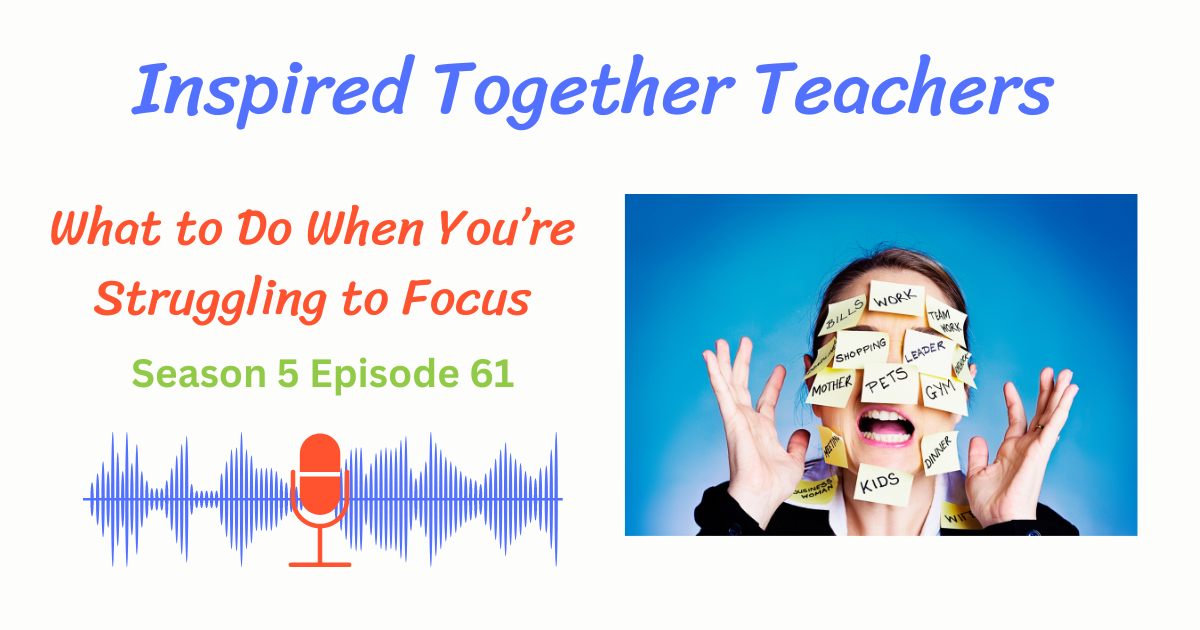Finding Balance Between Work Life and Home Life S. 5 E. 70
Listen to this episode to learn strategies for finding balance between your work life and home life.
Show Notes:
Episode Summary:
We’ve all been too busy, too exhausted, and too overwhelmed to make the kind of difference we want to make for our students and still enjoy the rest of our lives.
School has a way of taking over your life. If you have struggled with overwork and exhaustion and are feeling like you are never good enough and will never get it all done, it might be time to take back your life.
We certainly don’t have all the answers. In this episode we’re talking about finding balance in our work and home lives. We’re going to tackle the real story about finding balance.
In this episode:
Finding balance- there is a loaded topic! It’s like the Holy Grail, if we could just find balance between work and home, everything would be so much better.
It is a constant push and pull. Sometimes school wins, sometimes home wins, and sometimes your personal needs win.
The real story is that finding balance is a misnomer. You probably won’t find balance. However, there are some strategies that allow you to create a more balanced life.
How to create more balance and take back your life.
-
Set boundaries.
You want to be responsive and helpful to students, colleagues and parents, but it can’t come at a cost of total lack of a personal life. You don’t need to be on call 24/7. Don’t be afraid to set boundaries for what you will and will not do.
- Create a personal policy for returning parent phone calls and email.
- Set a pleasant automatic response that tells others when you will return messages.
- If parents or students are constantly texting you, reconsider giving out your phone number.
- It is not part of your job to call a student every morning and wake him up for school. It is not part of your job to be awakened by a parent’s text at midnight- or to respond to it.
-
Check your level of perfectionism.
- If you have high standards and want to do everything perfectly, chances are it is causing you stress.
- Perfection is not possible. There will always be a better lesson plan or a more perfect activity. A teacher’s work is never done, and the to-do list always exists.
- If you like to have everything done and crossed off the list, you will be constantly frustrated.
- Accept the fact that there are always things on the to-do list, but they don’t all have to be done
- If you are exhausted, resentful and angry about how much you are working, look at your own expectations. Some things deserve 100% of your attention and skill. Other things might be just fine with B+ effort, or maybe even C+ effort. Spend your time on things that matter, and remember that sometimes, done is better than perfect.
-
Stop comparing yourself to others.
Are you trying to keep up with the amazing teacher next door or the fun teacher on social media? Are you exhausted yet?
We each have our own gifts. There is something that you do that is unique and different from other teachers. Perhaps you give students amazing feedback. Perhaps you have a gift for making all students feel special. You might be the one whose jokes keeps kids engaged or the one whose passion for your subject inspires them.
Don’t try to copy other teachers. You can learn from them and borrow their teaching ideas or tools but recognize that you can teach in your own way.
Also, be cautious with social media; it is easy to compare yourself to influencers and come up short. Remember that you also have special things that you know and do.
-
Start Your Day with Intention
The busier you are, the more you need to focus your time and energy on the things that are most important. When you have more things to do that time to do them, you need to prioritize where you put your attention.
Prioritizing is hard, especially when all the things feel important.
Without prioritizing what you do, your day easily gets hijacked.
If you don’t focus on what is most important, it is easy for others to make demands that seem like priorities in the moment but may not be your priorities.
Take a couple of minutes first thing every morning and list your top 3 priorities. Make sure those three things get done. That is a win.
-
Focus on things you can influence.
Everything that bothers you is not within your circle of control. We can waste a lot of time and energy worrying about things that we can’t actually do anything about.
Look at your current situation. Identify which aspects of your situation you can control- and which you can’t. Then, let go of the things that stress you that you can’t control.
Identify the areas that you can control. These are the places where your actions can have an impact.
Pick one small thing you can control and do it.
Concentrating your efforts on small things that you can control helps you to realize that you can make a difference. Positive action increases our positive mindset and gives us a greater confidence in our abilities.
-
Reduce stress by completing the stress cycle.
Many of the factors that contribute to stress are out of our control. There are things we can do to feel less stressed but most of those revolve around changing how we react to stress.
When we experience stressors-our body engages in a neurological and physiological shift.
You’ve felt the effects of stress on your body: increased heart rate, faster breathing, and heightened senses. Stress also messes with your digestive system, other organs, your immune system, and reproductive system.
Stress often stays with us, unless we do something to reduce the stress. That’s chronic stress, and it has many negative results including headache, anxiety, irritability, depression, insomnia, higher blood pressure, higher blood sugar, higher risk of heart attacks and even fertility issues.
All is not hopeless. Despite ongoing stress there are things we can do to complete the stress cycle so that our bodies can return to normal. We aren’t changing the stressors- just changing our reaction to the stress so that our bodies can let it go and reset to more normal pattens.
What can we do to complete the stress cycle? In the book Burnout, Emily and Amelia Nagoski suggest:
· Do anything to help your body move and sweat.
· Stand up and take a few big breaths.
· Breathe deeply.
· Engage in positive social interactions.
· Laugh.
· Show affection. Hug someone.
· Cry.
· Do something creative.
-
Ask For Help
Teachers often try to do it all. We fill our plates to the point of overflowing without the proper supports in place. Yet, even the knowledge that we are doing this to ourselves does not often stop it from happening again.
Consider that there are people who can help. They may be willing to share of their time, their talents, and resources.
As the old saying goes, “It never hurts to ask. The worst they can do is say ‘no.”
Conclusion:
We want you to be here for the long haul. We need good, passionate, committed teachers. The danger of burn-out is real, as is the danger of losing good teachers to a less demanding profession. In order to continue to love your job, you need to find ways to rest, relax, and recharge. If things are feeling out of control, do what you can to take back your life. You might not be able to find balance, but you can create a more balanced life.
We have created a free resource to help busy teachers create balance. You can download the free guide/work book on the homepage of our website, inspiredtogetherteachers.com.
Recap:
Finding balance between our work life and home life is a challenge. Learn to set boundaries, check your perfectionism and stop comparing yourself to others. Start your day with intention. You can also focus on things that you can control. Completing the stress cycle will reduce your stress, and you can ask for help. Chance you are won’t find balance, but with these strategies you can create more balance.
Related Episodes/Blog Posts:
Inspired Together Teachers Podcast Episode 6 Set Priorities to Take Back Your Life
Inspired Together Teachers Podcast Episode 7 Prevent, Eliminate and Reduce Stress
Inspired Together Teachers Podcast Episode 8 Choose Your Battles
Inspired Together Teachers Podcast Episode 11 Maximize Your Morning Routine
Inspired Together Teachers Podcast Episode 16 Real Self Care
Connect with the Inspired Together Teachers Community:
Website: https:www.inspiredtogetherteachers.com
Instagram: Inspired-Together-Teachers
Facebook: Inspired Together Teachers
Facebook Teacher Warriors Group: Teacher Warriors Facebook Group
Linked In: Inspired Together Teachers
More About Inspired Together Teachers:
Are you a teacher struggling to balance your best work with your best life?
If you are dedicated and caring but often overwhelmed and exhausted, join us at Inspired Together Teachers. We’ll give you inspiration, strategies and tips that help you navigate life’s challenges as a stronger, more confident, and more joy filled person, both in and out of the classroom.
Inspired Together Teachers will give you practical tools to experience more of what matters most in your life.
Co-hosts Paula Schmidt and Michele Vosberg are award winning educators with the experience and skills to help teachers thrive in life and work. They’ve taught at all levels, worked with thousands of teachers, and conducted workshops around the world. They are also the authors of the #1 best-selling book The Inspired Teachers Journal: A Weekly Guide to Becoming Your Best Self.
Paula and Michele would love to have you to join them on their quest to lived inspired lives.






